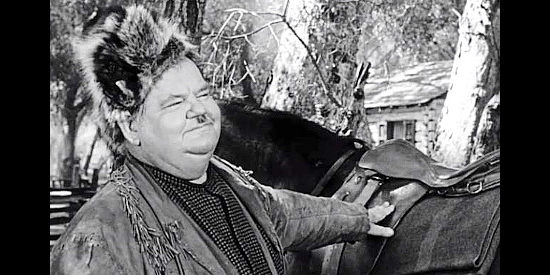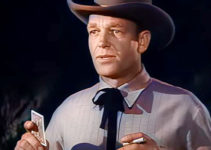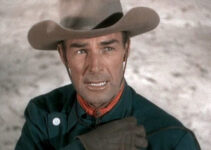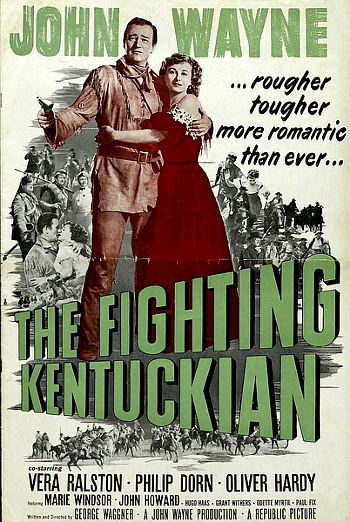 John Wayne plays John Breen, the fighting Kentuckian of the film’s title. But in opening scene, he tries to delay rejoining his fellow Kentuckians on their 800-mile march by riding around Mobile, Alabama, in a carriage with pretty Fleurette De Marchand (Vera Ralston), whom he’s just met.
John Wayne plays John Breen, the fighting Kentuckian of the film’s title. But in opening scene, he tries to delay rejoining his fellow Kentuckians on their 800-mile march by riding around Mobile, Alabama, in a carriage with pretty Fleurette De Marchand (Vera Ralston), whom he’s just met.
It’s pretty much love at first sight for the two. And though Breen tries to talk himself out of such foolishness, he finds himself guiding the militia out of their way so he can visit Fleurette in the French community of Demopolis.
She’s one of the French refugees and former followers of Napoleon attempting to build a new home in Alabama after the Battle of Waterloo sent his generals into exile.
The refugees have received a great amount of help from Blake Randolph (John Howard). So much so that Fleurette’s father, Gen. Paul De Marchand, has agreed to a marriage between Randolph and Fleurette.
Breen hangs around anyway, first because he wants to whisk Fleurette off before she can marry Randolph, later because he stumbles upon a plot to rob the French of their land.
Seems Randolph was being so helpful to the French that he helped them settle on the wrong land, later planning to push them off it as part of a conspiracy with George Hayden (Grant Withers) and pretty Ann Logan (Marie Windsor).
Randolph decided not to go through with the plan after falling in love with Fleurette; Hayden isn’t nearly as willing to scuttle those plans.
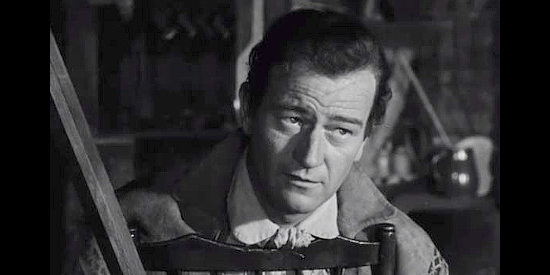
John Wayne as John Breen, hearing details about how the French have been tricked into settling on the wrong land in The Fighting Kentuckian (1949)
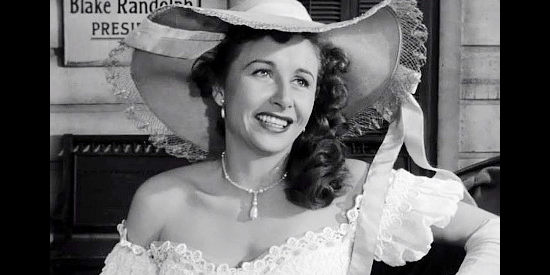
Vera Ralston as Fleurette De Marchand, bored and about to take a buggy ride with a stranger in The Fighting Kentuckian (1949)
One of several Wayne Westerns from the 1940s that certainly isn’t a classic, but mixes comedy and action to deliver an entertaining film.
In this case, the comedy is helped along by a sidekick — Oliver Hardy in the role of Willie Paine. It marked one of only two films Hardy made without partner Stan Laurel, who was reportedly ill at the time and prodded Hardy to accept the role.
The plot has Wayne and Hardy pose as surveyors at one point, as fiddlers at another in an attempt to stay close to Fleurette. During their stint as fiddlers, each musician is expected to deliver a solo. You can guess how Wayne’s goes.
This marked the second time Wayne and Ralston starred together; they’re better as a couple in 1945’s “Dakota.” He later called her the worst actress he ever had the misfortune of working alongside. Oh, well, as usual, she looks lovely.
As for the plotline about French followers of Napoleon taking exile in Alabama, that is indeed true. The U.S. government approved a grant giving them four townships, each of six square miles, hoping to spur a wine and olive industry in America. There was also a community of Demopolis, erroneously constructed outside the area included in the land grant.

Marie Windsor as Ann Logan, stepping in to rescue John Breen (John Wayne) from trouble in The Fighting Kentuckian (1949)
Directed by:
George Waggner
Cast:
John Wayne … John Breen
Vera Ralston … Fleurette De Marchand
Philip Dorn … Col. Georges Geraud
Oliver Hardy … Willie Paine
Marie Windsor … Ann Logan
John Howard … Blake Randolph
Hugo Haas … Gen. Paul De Marchand
Grant Withers … George Hayden
Odette Myrtil … Madame De Marchand
Paul Fix … Beau Merritt
Mae Marsh … Sister Hattie
Jack Pennick … Capt. Dan Carroll
Mickey Simpson … Jacques
Fred Graham … Carter Ward
Mabelle Koenig … Marie
Runtime: 125 min.
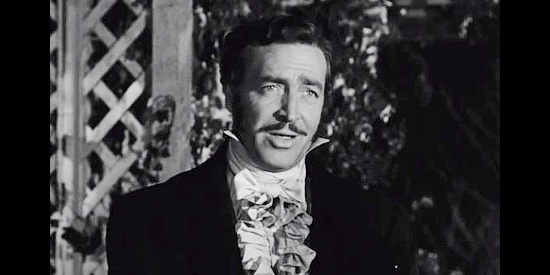
John Howard as Blake Randolph, the well-off American who plans to marry Fleurette in The Fighting Kentuckian (1949)
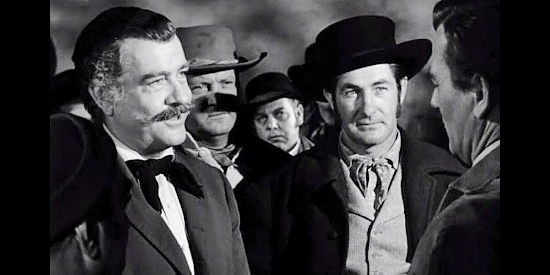
Grant Withers (left) as George Hayden, the man who came up with the plan to swindle the French settlers in The Fighting Kentuckian (1949)
Memorable lines:
John Breen to Fleurette: “You’re downright discouragin’ to romance, ma’am. Couldn’t you act just a little frightened to save my pride?”
John Breen to Fleurette: “You look beautiful with your eyes shining like that.”
Fleurette: “Mr. John Breen of Kentucky, can you please …”
Breen: “You’re also inclined to talk too much.”
Willie Paine, as he and John Breen pretend to be surveyors: “How much longer do we have to do this?”
Breen: “Until something happens.”
Beau Merritt, offering John Breen a drink: “Have a shot?
John Breen, holding his wounded arm: “Just had one.”
Blake Randolph: “You see, Mr. Breen, you’re a hero. And in the heroic tradition, you must wait for me to make the first move. Personally, I think that’s rather foolish. In your position, I wouldn’t hesitate. Strange, isn’t it? The very think that makes you a hero is the very thing that makes you vulnerable to a man like me.”
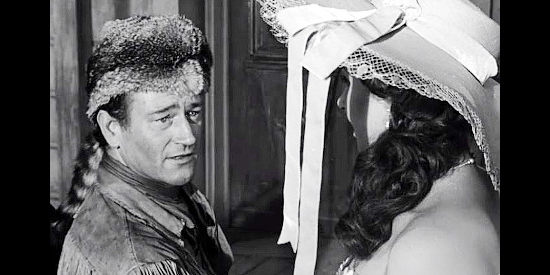
John Wayne as John Breen, catching his first glimpse of lovely Fleurette De Marchand (Vera Ralston) in The Fighting Kentuckian (1949)
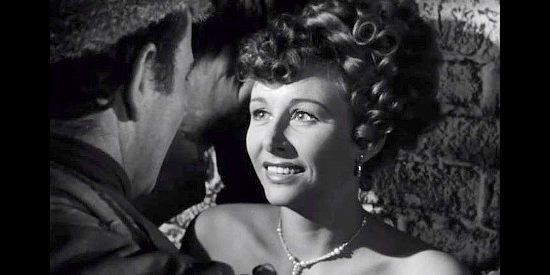
Vera Ralson as Fleurette De Marchand, agreeing to run off with John Breen (John Wayne) in The Fighting Kentuckian (1949)
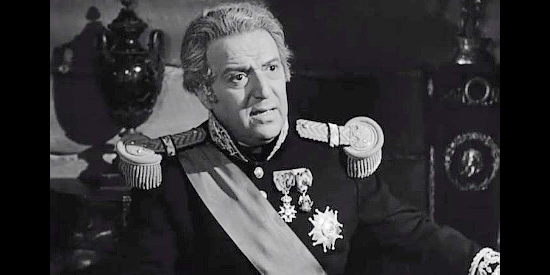
Hugo Haas as Gen. Paul De Marchand, leader of the French settlement in Alabama in The Fighting Kentuckian (1949)
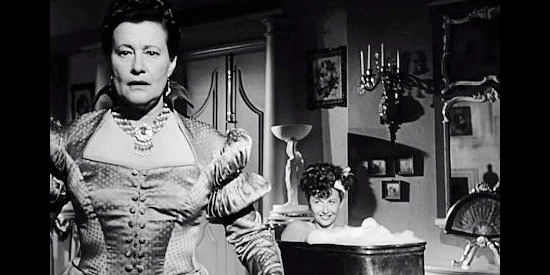
Odette Myrtil as Madame De Marchand, tricked into telling how she fell in love with a penniless man by her daughter in The Fighting Kentuckian (1949)
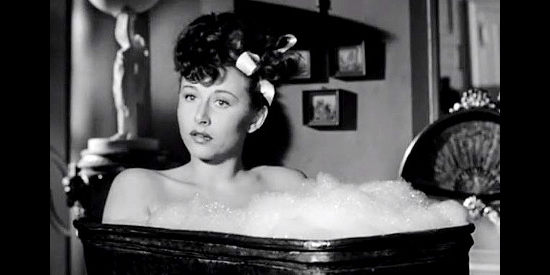
Vera Ralston as Fleurette De Marchand, wondering if she’ll ever see John Breen again in The Fighting Kentuckian (1949)
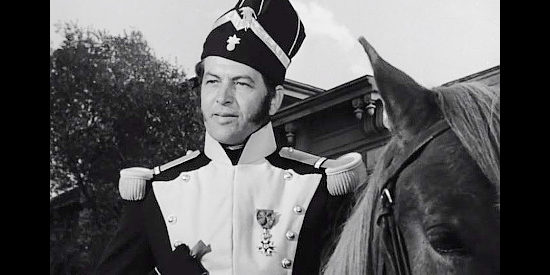
Philip Dorn as Col. George Geraud, commander of the exiled French soldiers who have settled in Alabama in The Fighting Kentuckian (1949)
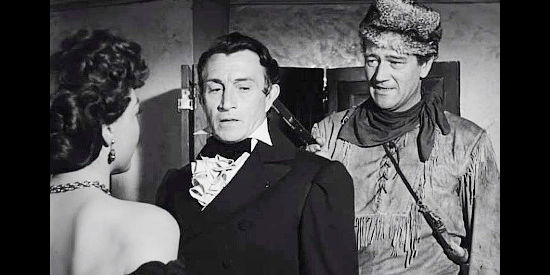
John Wayne as John Breen, forcing the truth about the plot to cheat the French from Beau Merritt (Paul Fix) at the point of a gun in The Fighting Kentuckian (1949)
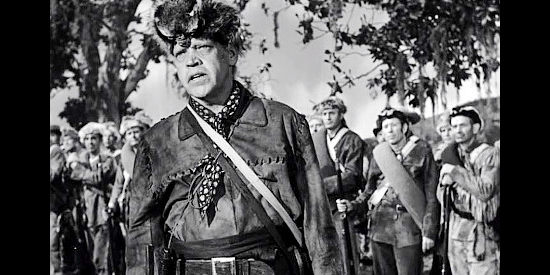
Jack Pennick as Capt. Dan Carroll, commander of John Breen’s Kentucky unit in The Fighting Kentuckian (1949)
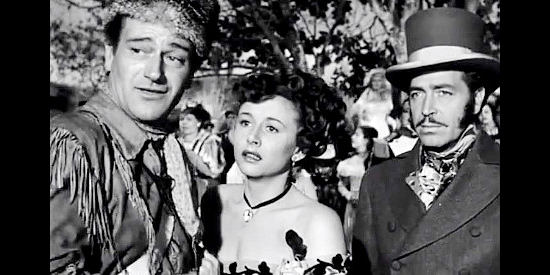
John Wayne as John Breen, Vera Ralston as Fleurette and John Howard as Blake Randolph watch a brawl break out in The Fighting Kentuckian (1949)
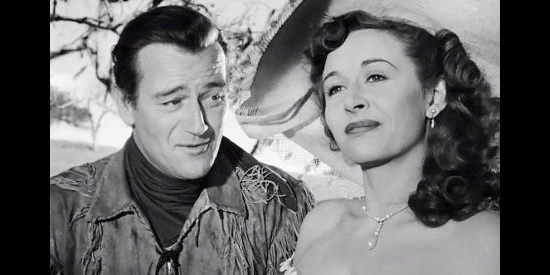
John Wayne as John Breen, smitten with Fleurete de Marchand (Vera Ralston) in The Fighting Kentuckian (1949)

